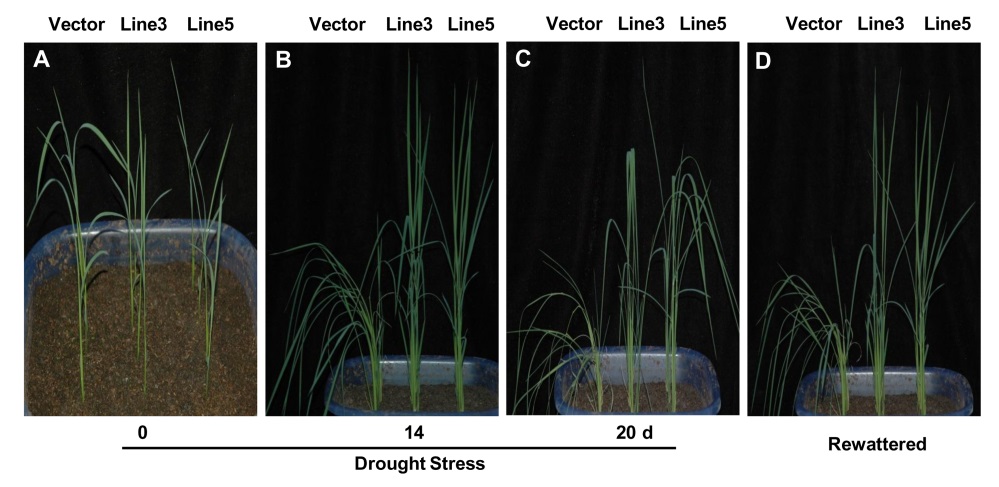
Drought is a critical abiotic stress that severely restricts crop production. Under drought-or salt-stress conditions, plants accumulate reactive oxygen species (ROS). WRKY transcription factors belong to a large family that functions under a variety of abiotic stresses. In a previous study by Prof. YU Diqiu and his team of Xihsuangbanna Tropical Botanical Garden (XTBG), the researchers demonstrated that overexpression of AtWRKY57 significantly conferred drought tolerance in Arabidopsis.
The previous study gave them a hypothesis that the improvement of plant drought tolerance might be realized through gene manipulation approaches. To explore whether AtWRKY57 played an important role in improving the agronomic traits through gene manipulation approaches, the researchers introduced this gene to rice and evaluated the role of AtWRKY57 in transgenic rice after drought stress.
The drought-tolerance phenotype of AtWRKY57 transgenic rice plants were the result of a collection of physiological indexes observed in the over-expressing plants. AtWRKY57 overexpressing plants displayed higher survival rates most likely because the water loss was reduced in these plants compared to control plants under drought conditions.
The researchers observed high levels of superoxide, H2O2 and cell death in control plants than in transgenic lines. They detected lower levels of programmed cell death (PCD), 3,3′-Diaminobenzidine (DAB) and nitro blue tetrazolium (NBT) staining, Malondialdehyde (MDA) content and relative electrolyte leakage in AtWRKY57 transgenic plants. However, increased superoxide dismutase (SOD), POD (a group of enzymes that catalyze the oxidation of many substrates at the expense of H2O2), and catalase (CAT) activity levels and elevated oxidative enzyme genes’ transcript levels were detected after drought stress. The results demonstrated that the AtWRKY57 transgenic plants were better protected from oxidative damages through the enhanced capability to scavenge ROS.
They also found that the transcript levels for several stress-tolerant genes were more elevated in AtWRKY57 transgenic rice than in control plants under drought-stress conditions. The enhanced capability to scavenge ROS was important for AtWRKY57 overexpressing transgenic rice plants to tolerate drought stress.
Their results provided evidences that overexpressing AtWRKY57 also increased the tolerance to salt and PEG stresses, demonstrating that this is a potential candidate gene for crop improvement.
The study entitled “Heterologous Expression of AtWRKY57 Confers Drought Tolerance in Oryza sativa” has been published in Frontiers in Plant Science.

Overexpressing AtWRKY57 enhanced drought tolerance in rice (Image by JIANG Yanjuan)

86-10-68597521 (day)
86-10-68597289 (night)

86-10-68511095 (day)
86-10-68512458 (night)

cas_en@cas.cn

52 Sanlihe Rd., Xicheng District,
Beijing, China (100864)

